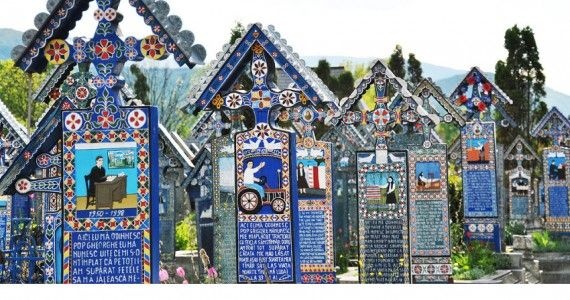

Săpânţa is a small town of 5,000 (living) souls in northern Romania there's a unique cemetery, known as theCimitirul Vesel - the Merry Cemetery. It's called that with good reason Each grave is marked, not with an austere, cold stone, but with a lively, beautifully carved wooden cross, painted in the radiant blue of heaven and decorated with a painting and an original poem that disclose a little something about the life and character of the plot's eternal inhabitant. Some of the verses are wickedly funny, others are more whimsical. Some are heartbreaking, telling of lives tragically cut short by accidents or illnesses. When someone in the village dies, the family comes to Pop and asks him to create a cross, which he hand-carves from oak in the small workshop behind his house, just around the corner from the church. Pop alone decides what the picture will portray and what the verse will say. The poems aren't irreverent - they don't mock the grave or its tenant - but some of them do seem, well, a touch indiscreet, telling witty stories of infidelities, indiscretions and a fondness for alcohol.
"Here I rest.
Stefan is my name.
As long as I lived, I liked to drink.
When my wife left me,
I drank because I was sad.
Then I drank more
to make me happy.
So, it wasn't so bad
that my wife left me,
Because I got to drink
with my friends.
I drank a lot,
and now, I'm still thirsty.
So you who come
to my resting place,
Leave a little wine here."
Pop says he creates about 20 to 30 crosses per year - depending on ... well, you know. In the meantime, he, like most people in rural Romania, does some small-scale farming. He also makes hand-carved furniture and decorative pieces, most of which flaunt his incisive wit. The cemetery contains about 700 graves and even though it's an extremely popular place - with both the dead and the quick (it's one of Romania's most popular tourist sites) - there's still plenty of room for future occupants, one of whom will be Pop himself. He's got his plot reserved and is in the process of making sure that the tradition doesn't die off just because he did. He's training several apprentices to take over. "But they can't be just anybody," he says. "They have three jobs to do ... they have to be sculptors, painters and poets, all in one."



